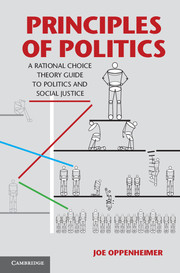Book contents
- Frontmatter
- Contents
- Propositions and Corollaries
- Tables
- Figures
- Sidebars
- Definitions
- Preface
- Overview of the Book
- Acknowledgments
- Introduction: Politics, Universals, Knowledge Claims, and Methods
- Part I The Logic of Collective Action
- Chapter 1 Voluntary Contributions and Collective Action
- Chapter 2 Going Beyond the Prisoner Dilemma
- Chapter 3 Collective Action Applications to and Beyond Democratic Politics
- Part II Collective Choice
- Part III Political Institutions and Quality Outcomes
- Part IV Social Justice, Choice, and Welfare
- Bibliography
- Name Index
- Subject Index
Chapter 2 - Going Beyond the Prisoner Dilemma
Published online by Cambridge University Press: 05 August 2012
- Frontmatter
- Contents
- Propositions and Corollaries
- Tables
- Figures
- Sidebars
- Definitions
- Preface
- Overview of the Book
- Acknowledgments
- Introduction: Politics, Universals, Knowledge Claims, and Methods
- Part I The Logic of Collective Action
- Chapter 1 Voluntary Contributions and Collective Action
- Chapter 2 Going Beyond the Prisoner Dilemma
- Chapter 3 Collective Action Applications to and Beyond Democratic Politics
- Part II Collective Choice
- Part III Political Institutions and Quality Outcomes
- Part IV Social Justice, Choice, and Welfare
- Bibliography
- Name Index
- Subject Index
Summary
Although considerable leverage is gained by modeling a collective action problem as a prisoner dilemma game, many, if not most, social problems are only similar to prisoner dilemma situations. Voting is an example of a social institution that leads to situations that are very close, but not actually, prisoner dilemmas. When one votes, quite clearly, the essence of voting is that the vote one casts will be counted and hence counts. Although unlikely, it could make a difference; it could change the outcome.
This possibility, that the vote matters, implies that there is no dominant strategy. For if one’s vote can matter, then under precisely those circumstances, presumably, it pays to vote. Thus, voting is fundamentally different from the standard prisoner dilemma game.
It follows that there is more to be understood about collective action than we can model with the prisoner dilemma. And yet, as we shall see, the fundamental similarities between our expanded set of collective action cases helps us use the tools we have already developed to understand the situation. Our analysis of simple modifications of these new situations leads to some surprising results.
- Type
- Chapter
- Information
- Principles of PoliticsA Rational Choice Theory Guide to Politics and Social Justice, pp. 60 - 70Publisher: Cambridge University PressPrint publication year: 2012



